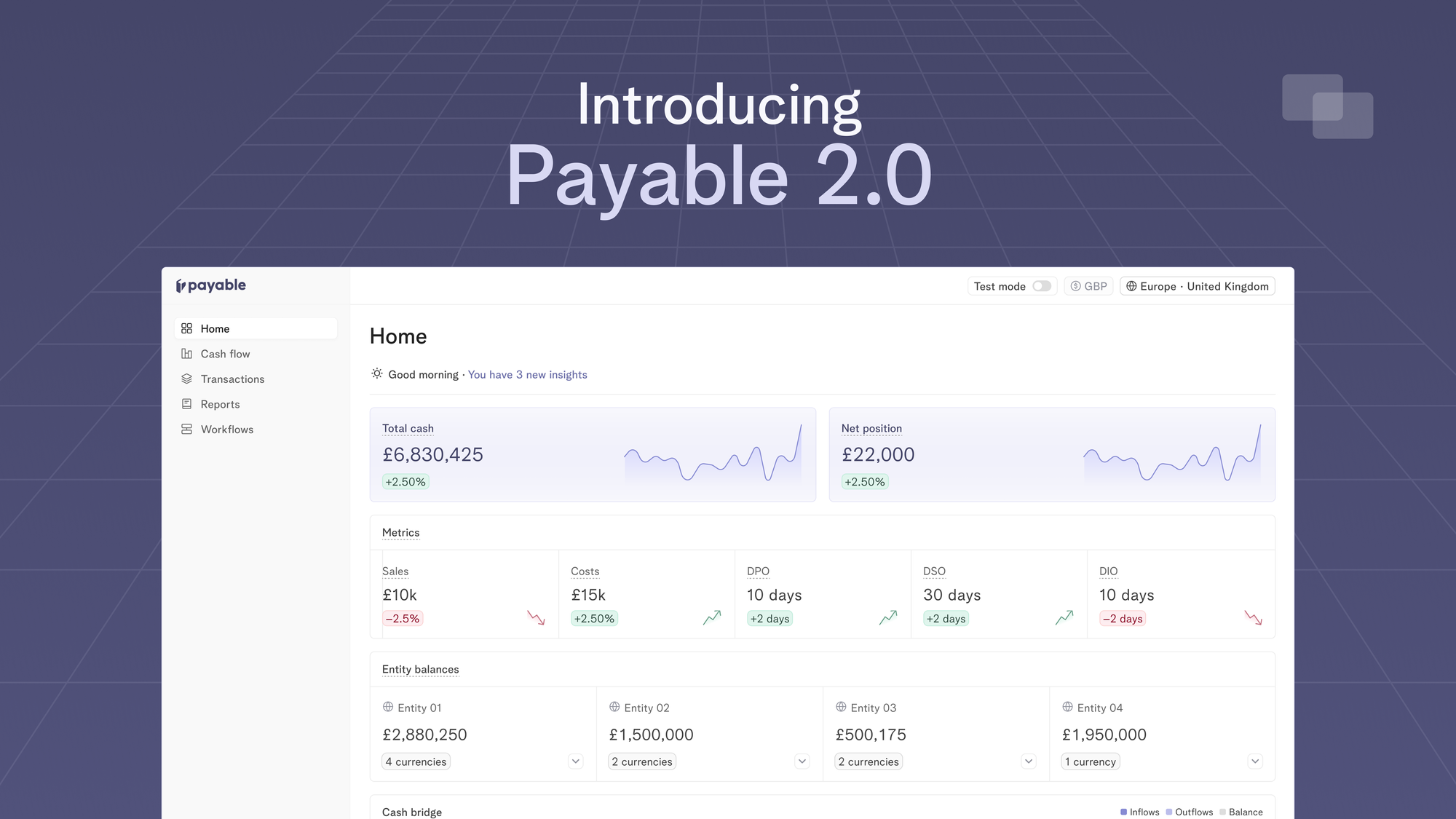
Last month we celebrated our 1st anniversary since launching Payable, which made us reflect on our journey, why we started Payable and what the future holds.
As a former product manager, I was in a world brimming with tools designed to enhance my performance – tools that boosted productivity, enabled cross-team collaboration and ultimately empowered better decision making for the business. Just as I rely on Slack, Jira, and Figma, engineers thrive on Github, and salespeople can't do without Salesforce.
These tools are an integral part of how businesses operate today - they help companies shape the world, bring teams together to build new products, transform productivity to innovation, and turn the difficult into the achievable.
But there's a hidden team in every business, tucked away in the back office, often overlooked and deprived of the luxury of choice. We're talking about finance and treasury functions. These are the heroes that manage the lifeblood of a company - its cash. They dedicate their time managing risk and cash flow, rather than solely chasing profits.
The neglected team: Finance & Treasury
At checkout.com, Raz and I had the pleasure of building and launching products that enabled merchants to accept payments online. However, as we introduced more products, we noticed our treasury and finance teams grappling to stay on top of the cash flow and identifying available funds in real time. With a growing reliance on spreadsheets and isolated data sources, they simply couldn't keep pace with the company's ambitions.
And because neither finance nor treasury are directly responsible for generating profit (hats off to every commercial time out there!), it is hard for these unsung heroes to argue their business case. As a result, finance teams are often left making business critical decisions relying on data silos and spreadsheets. When innovation does come knocking, treasury is sadly pushed to the backseat, expected to "make it work" amidst a broader company transformation - usually part of a costly and complicated ERP solution that takes months to implement.
Treasury management is hard
Imagine juggling your personal finances: a current account, a couple of credit cards, and direct debits for Netflix and gym memberships. On payday, you do your financial jiu-jitsu shifting funds around to cover all your obligations. It's a bit of a hassle, but it's manageable.
Now, picture the same scenario in a business context. Millions (or billions) of a company's assets (that’s financial jargon for cash) are in motion multiplied by the complexity of multiple bank accounts, regional entities and different currencies while scaling and growing. Suddenly, knowing your company's available cash at any given moment becomes a complex puzzle, never mind making strategic decisions to reduce risk, evaluate investments, or capitalise on interest rate opportunities.
The truth is, treasury management is hard, because it's essential for keeping businesses thriving and alive.
That is what we solve at Payable.

Automating the Treasury function
One of our customers today is using Payable to manage and reconcile a global fund across 40 different bank accounts. Another customer had over €5m of missing payments and with Payable they have increased their working capital all while reducing their DSO (Day Sales Outstanding) which used to be 25 days and an operational nightmare to the finance team.
A year in, at Payable we have built a suite of products that automates treasury function in one centralised dashboard helping our customers make better decisions for their business. We are on a mission to modernise the treasury stack for everyone, not the selective few that can afford it. We believe in inclusivity and levelling the playing field, so every business can thrive.
Imagine the convenience of having all your corporate accounts seamlessly integrated into one simple dashboard. We effortlessly track and reconcile incoming funds while giving you a heads-up if any expected payments go astray.
The next generation of Treasury tools
Today, Payable gives full visibility to your working capital across all your accounts, currencies and entities. Tomorrow, we will bring value added features to maximise your returns through hedging, investments and FX payouts. The lens through which you view your financial landscape will become a lot clearer, enabling your teams to seize investment opportunities and mitigate risks.
And, the day after tomorrow?
Payable will be the default choice for all treasury and finance teams. The same way you can't think about engineering without Datadog or Github, product planning without Miro, or sales without Hubspot or Salesforce, finance and treasury won't be imaginable without Payable.
Daniel and Raz
Financial Automation
07 Aug 2024
Prior to launching Payable, I built platform and marketplace payments at Checkout.com. Picture this a seller in one country, a buyer in another, and a marketplace connecting them—taking a cut. This experience opened my eyes to fintech infrastructure. The Fintech Trifecta: Cheaper, Faster, Simpler Fintech revolves around moving money efficiently. Venture capital investment theses in fintech universally revolve around three core principles: cheaper, faster, and simpler solutions. Whether it's c

Announcements
Introducing Payable 2.0 - one platform to optimise working capital, make fast liquidity decisions and move your cash metrics in real-time
13 Apr 2024
Today, we’re excited to launch Payable 2.0 which is our evolution to a more connected, intelligent and automated platform for finance teams to track their cash flows in real-time.

